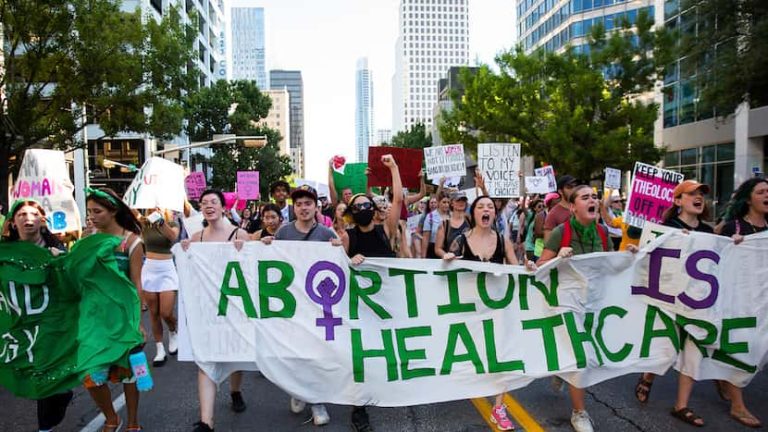Pastor Erica Ferguson still has text messages from three years ago on her phone. She was counseling a young girl wondering whether to get an abortion when Senate Bill 8 went into effect in 2021. The law is one of three overlapping laws in Texas that ban abortion in all circumstances except to protect the mother’s life.
Ferguson told The Nation that the girl didn’t know how to get across town by bus, let alone fly out of state to get an abortion, so he knew he had to find a way to help her.
Since then, Ferguson and fellow clergy have secretly escorted a group of more than 100 women seeking abortions to New Mexico, where abortion is legal. Ferguson made the effort public at a press conference in Dallas on Monday, two years after the landmark U.S. Supreme Court decision that overturned the constitutional right to abortion.
“We’ve been very clear that we’re not afraid,” Ferguson said, “and we’re making sure that every Texas woman who wants to fly out of Texas to get the abortion care she needs has the accompaniment, support and care they deserve.”
The Texas effort is part of Ferguson’s larger Tubman Travel Project, in which he honors the perilous journey enslaved people once took to reach free states. The group, partnered with New Mexico-based Faith Roots (formerly the New Mexico Religious Coalition for Reproductive Choice), is one of several organizations that have helped Texans travel to “abortion safe zone” states. Fund Texas Choice and Lilith Fund also provide financial and emotional support to abortion seekers.
These groups have long operated under the threat of lawsuits: After Roe v. Wade was overturned, the fund temporarily stopped paying Texans to get out of state for fear of prosecution, but cautiously resumed doing so after a federal judge ruled in February 2023 that criminal charges were unlikely.
The number of abortions in Texas has fallen from an average of 4,400 a month before Roe v. Wade was overturned to just five. Out-of-state abortions and telemedicine access to the abortion pill, approved by the Food and Drug Administration for up to 10 weeks of pregnancy, have partially offset the impact of the Texas abortion ban.
States like New Mexico are rushing to expand services to accommodate an influx of abortion seekers from about two dozen states that ban or severely restrict abortion. Many states are also strengthening legal protections for patients and their companions. Senate Bill 13 would protect health care providers and patients from civil or criminal liability for abortion or gender-affirming care in New Mexico.
On Monday, anti-abortion groups marked the anniversary of the Dobbs shooting while groups such as the Tubman Travel Project reaffirmed their support for Texans seeking abortions, and the Texas Alliance for Life pointed out the “vast resources” available to people with unplanned pregnancies.
“As we celebrate this anniversary, we reaffirm our commitment to building a culture of life in Texas – by ensuring Texans know about the vast resources and support available to help women and families in need, so abortion is never even considered,” Texas Alliance for Life executive director Joe Pojman said in a statement. “The more aware women are of the resources available to them, the less likely they are to risk their health, lives and future fertility in search of chemical abortion pills that are illegally smuggled into the state, or travel outside the state to end the life of an unborn child through abortion.”
While it is illegal to mail abortion pills in Texas, doctors in “shield” states such as New York can prescribe the pills via telemedicine to patients in states where abortion is illegal. Abortion opponents have long questioned the safety of the pills. More than 100 scientific studies have concluded that mifepristone and misoprostol, the abortion pills commonly used in the United States, are safe methods of terminating a pregnancy.
A recent U.S. Supreme Court decision ended a lawsuit by conservative groups seeking to revoke the FDA’s approval of mifepristone, but did not affect Texas’ ban of the drug.
In Texas, women have alleged that the state’s abortion ban caused them to delay or be denied treatment during medical emergencies for fear that doctors would violate the law. In May, the Texas Supreme Court ruled against more than 20 Texas women who had sued the state for allegedly delaying or being denied abortions during medical emergencies because of the state’s abortion ban. The lawsuits sought to exempt Texans with complicated pregnancies from the abortion ban.
Alliance for Life and other anti-abortion groups reject the allegations that the ban creates difficulties for medical workers when treating pregnant patients.
“We have doctors in Texas who clearly understand that the law allows them to intervene to save a woman’s life,” Amy O’Donnell, communications director for Alliance for Life, told The Texas Tribune. “No woman has lost her life, and no doctor has been prosecuted, lost their license or faced any penalties.”
The Texas Medical Association last week sought to provide clarity by issuing rules for doctors who practice under the abortion ban, but doctors say the guidelines are insufficient.
Nationwide, abortions increased slightly last year as states where abortion is legal expanded care.

